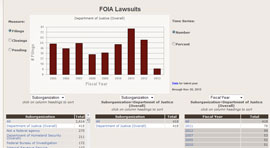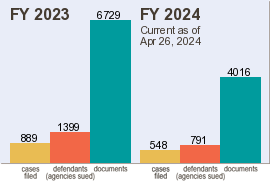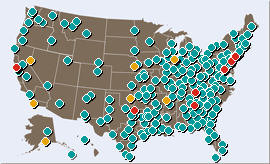Vote for the Worst FOIA Failure
Biggest FOIA Fail?
- Bay of Pigs History (26%, 68 Votes)
- Snowden Damage (25%, 67 Votes)
- Kennedy FBI File (24%, 63 Votes)
- Secret Surveillance (13%, 33 Votes)
- FBI Drones (7%, 19 Votes)
- Awlaki Memo (5%, 14 Votes)
Total Voters: 264
Democracy depends on educated citizens who know what their government is doing. The Freedom of Information Act is the federal law that empowers citizens to get information about the government, from the government. Yet many agencies routinely ignore the law, and FOIA requests often fall into a bureaucratic black hole.
Every year, several hundred frustrated requesters sue in federal court for the documents they have been blocked from receiving. We’ve asked six prominent journalists, open government advocates, and lawyers to highlight the FOIA failure they feel represents the most egregious example of improper withholding under FOIA.
Now we want you to vote on the worst of the worst!
We closed voting at 10 this morning (3/20/15). The vote counts reflected in the poll at right are the final counts. They include votes left on a companion poll by Android users who had trouble with the one on this page. We’ll be posting more on the results soon.
Awlaki Memo
 Nominator:New York Times Reporter Charlie Savage
Nominator:New York Times Reporter Charlie Savage
Documents sought: Memorandum on the legality of killing of Anwar al-Awlaki, an American citizen, in Yeman via drone strike.
Case: The New York Times Company et al v. United States Department of Justice (NYS 1:2011cv09336); Appellate Case 13-422
Summary: When people commit crimes in America, they are arrested and prosecuted. If they participate in a battle against American troops abroad, they are combatants who can be legally targeted under the laws of war. But what if they are accused of plotting terrorist attacks from a location far from any battlefield but where they cannot feasibly be arrested? With the rise of drone warfare following the terrorist attacks of Sept. 11, 2001, the scope and limits of the president’s legal power to order targeted killings or assassinations has become a hotly debated issue. This became even more pitched when a 2011 U.S. drone strike in Yeman targeted and killed an American citizen, Anwar al-Awlaki. The Obama administration had never detailed its legal thinking about this extraordinary power. Before Awlaki’s death, The New York Times reporter Scott Shane had submitted a FOIA request to DOJ’s Office of Legal Counsel seeking legal memos about targeted killing operations in general. After the strike, The Times’ Charlie Savage wrote an article based on confidential sources about the contents of a secret Justice Department memo approving the targeting of Awlaki, and filed a FOIA request to obtain public disclosure of it. The government rejected both requests, refusing to confirm or deny that any such memos existed, and The Times filed a lawsuit on Dec. 20, 2011, according to the complaint. The American Civil Liberties Union separately filed a parallel case soon afterward.
Status: A Federal District Court judge ruled against The Times and the ACLU. But on June 23, 2014, the Second Circuit Court of Appeals ruled that “a redacted version of the … Memorandum must be disclosed.” The government has produced that memo, as well as an earlier, shorter version of it. Litigation continues over other legal memos related to targeting killing practices.
Why he picked the case: “The Second Circuit only sided with us because there had been so many other disclosures in between when we originally made the requests and when the matter reached the appeals court that the Obama administration could no longer pretend that these matters were secret. But I believe the withholding of the memos even in the first instance was an egregious abuse of secrecy. It is true that there was a competing concern: the Yemeni government in 2009 granted the United States permission to carry out airstrikes on its soil on the condition that the United States would pretend that the Yemeni air force was responsible. But by the time of the Awlaki strike in September 2011, it was fantasy to think that anyone in Yemen or the United States did not realize that this was happening, and the pseudo-secrecy could have been maintained by a fig-leaf redaction of the country name from the document. On the other side of the ledger, the American people had an overwhelming interest in understanding the scope and limits of the government’s understanding of its legal powers to kill citizens without trial, including for self-government and democratic accountability purposes.”
FBI Drones
 Nominator: Anne Weismann, Interim Executive Director and Chief Counsel, CREW (Citizens for Responsibility and Ethics in Washington)
Nominator: Anne Weismann, Interim Executive Director and Chief Counsel, CREW (Citizens for Responsibility and Ethics in Washington)
Documents sought: Documents on the funding, supply, training, and policies surrounding the FBI’s use of drones.
Case: Citizens for Responsibility and Ethics in Washington v. United Stated Department of Justice (DC 1:2013cv01159)
Summary: That the FBI had used drones to conduct domestic surveillance began to come to light on June 13, 2013, when Director Robert Mueller told the Senate Judiciary Committee that the FBI was using drones “in a very, very minimal way and very seldom,” according to the CREW complaint. A day later, the Electronic Frontier Foundation released documents it had obtained as the results of two FOIA suits (1, 2) against the Federal Aviation Administration that showed the FBI had sought and received permission to fly drones in 2009. On June 26, 2013, CREW filed a FOIA request to obtain basic information about the drone program, and asked for expedited processing given the keen public interest in the topic. On July 3, 2013, the FBI acknowledge receipt of the request, but denied the request for expedited processing. When no records were produced by the FBI by July 30th, CREW sued under FOIA in federal court.
Status: The case is still pending. On Sept. 4, 2013, the Justice Department answered the complaint, admitted that it had not yet furnished documents or communicated what, if any, responsive documents had been found. On Sept. 30, 2013, Judge Gladys Kessler ordered that the FBI continue processing CREW’s request. By January 2014, CREW had learned that FBI had identified 7,325 pages of potentially responsive documents, and that it would need until July 31, 2014, to processes those documents. Judge Kessler ordered in February 2014 that the FBI process at least 1,500 pages a month. By June 26, 2014, the FBI informed the court that it had found 6,720 non-duplicative pages, had released 1,970 of those pages (some of which contained redactions) and withheld the reminder as exempt under a variety of exemptions. It then filed for summary judgment on Oct. 15, 2014, and CREW crossfiled for summary judgment on Jan. 5, 2015. Since then, various replies and cross motions have been filed, with the final deadline for such motions set for March 23.
Why she picked the case: “There is a complete disconnect between the FBI’s public claims that it uses drones minimally as an adjunct to its domestic law enforcement duties, and its claim in the litigation that to protect national security and foreign intelligence interests it has classified a large number of documents and withheld them under Exemptions 1 and 3. The FBI’s goal seems quite clear: to shroud its drone program in secrecy to prevent the public from understanding its contours and whether and how it comports with the law.”
Snowden Damage
 Nominator: Jason Leopold, investigative reporter, VICE News
Nominator: Jason Leopold, investigative reporter, VICE News
Documents sought: Assessments of the damage caused by the Edward Snowden leaks
Case: Leopold v. Department of Defense (DC 1:2014cv00197)
Summary: Leopold filed a FOIA request with the Defense Intelligence Agency (DIA) on Jan. 31, 2014, for the official assessments of the damage done by the Edward Snowden leaks, requesting expedited processing. When he did not receive a response from the agency within the mandated 10 day period, he filed suit, according to the compliant.
Status: The suit is ongoing. In response to the suit, the Defense Department released more than 100 pages to Leopold, which he posted to VICE News and writes about here. But the pages are almost entirely redacted. The parties are now litigating those redactions in front of DC District Court Judge Judge Tanya S. Chutkan.
Why he picked the case: “For nearly two years, the government has been stating that Edward Snowden’s leaks have caused ‘grave’ damage to national security. But the government has so far refused to articulate exactly what the damage is. A year ago, lawmakers revealed that the Defense Intelligence Agency prepared a classified damage assessment about the Snowden leaks and the White House authorized two lawmakers to selectively leak general details of the report to undercut the narrative that Snowden is a heroic whistleblower.
“Last year, in response to my lawsuit, the DIA produced a heavily redacted version of the report, withheld half of the responsive pages entirely, leaving intact only a couple of dozen self-serving paragraphs. The agency last summer said it had located about 900 pages of documents referring to the report and withheld everything. Finally, in February, DIA produced about 144 pages of its internal damage assessment reports prepared by a Task Force made up of two-dozen employees who analyzed the damage. DIA redacted everything with the exception of subtitles. So more than 1,000 pages have either been withheld in their entirety or completely redacted. DIA cited FOIA Exemptions 1, 3, 5, 6 and 7(a) to justify the withholding of records. As we know, Exemption 5 is a discretionary exemption that government agencies could waive in favor of disclosure. But they rarely do.
“There is no question that some information in those damage assessment reports are legitimately classified, but there’s also a compelling public interest revolving around Snowden’s disclosures and its difficult to understand why DIA will not reveal more to support officials’ public claims that his leaks caused grave harm to national security and foreign relations.”
Secret Surveillance
 Nominator: David Sobel, Senior Counsel, Electronic Frontier Foundation
Nominator: David Sobel, Senior Counsel, Electronic Frontier Foundation
Documents sought: Opinion from the Foreign Intelligence Surveillance Court (FISC) that secret government surveillance violated the Fourth Amendment.
Case: Electronic Frontier Foundation v. Department of Justice (DC 1:2012cv01441)
Summary: In July 2012, Sen. Ron Wyden, D-Oregon, issued statements that indicated the Foreign Intelligence Surveillance Court had ruled that secret government surveillance and information collection operations were too broad and violated the Fourth Amendment. That promoted the Electronic Frontier Foundation (EFF) to file a FOIA request for the FISC opinion from the Justice Department’s National Security Division. When the agency failed to provide documents or a formal denial within 20 days, EFF sued, according to EFF’s complaint. In court, Justice Department lawyers argued that the documents were exempt from FOIA under Exemptions 1 and 3.
Status: As DC District Court Judge Amy Berman Jackson notes in her July 2014 opinion, most of the document in question had become public during the litigation as a result of the Edward Snowden leaks. That prompted the Justice Department to make about 80 percent of the FISC opinion available to EFF in response to the original FOIA request. The rest of the opinion was redacted, and EFF challenged the continued withholdings. Judge Jackson ultimately ruled the agency’s redactions were permissible under Exemption 1. Still, the disclosure was rich and provided unique insights into the secret workings of government and the legality of those actions, as detailed in this EFF post on the case.
Why he picked the case: “The Justice Department was in clear violation of FOIA when it failed to respond to us, and subsequently when it declared the entire document ‘top secret,’ including the text of the Fourth Amendment and other innocuous legal citations. The Snowden release made it clear that the government’s position was untenable, and so they recalibrated and released more of the document to us. In addition to this being a clear example of improper withholding, there can also be little doubt about the public interest involved in having this FISC court opinion in the public domain and part of the public discourse about government surveillance activities.”
Official History of the Bay of Pigs
 Nominator: Nate Jones, Director of the National Security Archive‘s Freedom of Information Act Project and Editor of Unredacted
Nominator: Nate Jones, Director of the National Security Archive‘s Freedom of Information Act Project and Editor of Unredacted
Documents sought: The Central Intelligence Agency’s Official History of the Bay of Pigs Operation
Case: National Security Archive v. Central Intelligence Agency (DC 1:2011cv00724) and Appellate Case 12-5201
Summary: The Archive first sought these documents in 2005, filing separate FOIA requests for each of the five volumes of the history, authored by CIA historian Jack Pfeiffer, according to the complaint and this overview by the Archive. The CIA responded with a notification that it would take more than 20 days to process the request, which is not uncommon. But it then failed to respond further, and became unresponsive to the Archive’s correspondence. On April 14, 2011, just days shy of the 50th anniversary of the Bay of Pigs invasion, the Archive filed its lawsuit. Soon after, the CIA released three of the volumes to the Archive. A fourth volume had already been declassified by the Kennedy Presidential Library. The CIA said it was withholding the final volume under the B5 Exemption, which shields from FOIA intra-agency communications and work products that are part of the deliberative process.
Status: The lawsuit clearly got the Archive some of what it sought, but judges at both the district and appellate court declined to order the CIA to release the fifth volume. In her opinion in the case, DC District Court Senior Judge Gladys Kessler chided the CIA for its lack of responsiveness, writing that, “The CIA has offered no explanation as to why it failed to provide any materials to the (Archive) in the five years and seven months that elapsed between acknowledgement of the FOIA requests and the filing of this lawsuit, but was able to release extensive materials three months after this lawsuit was filed.” Yet she ruled that it was proper to withhold Volume V under the B5 Exemption. The CIA’s brief argued that Volume V’s conclusions could ‘confuse the public with inaccurate historical information.’ The Archive filed its appeal in June 2012, and a three-judge panel ruled against the Archive 2-1 on May 20, 2014.
Hope for the future?:Jones said that “The majority opinion left two openings for transparency advocates. It invites Congress to set a time limit for applying the B5 Exemption, as Congress has done in the Presidential Records Act (12 years after the president leaves office). Second, it concludes that any ‘factual material’ contained in the draft should be reachable through Freedom of Information requests.The FOIA reform bills currently before the House and Senate both currently include a provision ending agencies’ ability to claim the B5 Exemption at 25 years.”
Why he picked the case: “Prior to these decisions, the Obama administration bragged that reducing the government’s invocation of the B5 Exemption was proof of the impact of the President’s Day One commitment to a ‘presumption of disclosure.’ Instead, the bureaucracy has actually increased its use of the B5 Exemption, which current White House counselor John Podesta once characterized as the “withhold if you want to” exemption.”
Kennedy FBI File
 Nominator: Chris Farrell, Investigations Director, Judicial Watch
Nominator: Chris Farrell, Investigations Director, Judicial Watch
Documents sought: Former Senator Edward “Ted” Kennedy’s FBI file.
Case: Judicial Watch, Inc. v. Federal Bureau of Investigation (DC 1:2010cv00963)
Summary: The FBI acknowledged Judicial Watch’s May 3, 2010, request for “any and all records concerning, regarding, or relating to a deceased individual named Edward Moore ‘Ted’ Kennedy,” and told Judicial Watch it would post responsive records by May 28, the complaint states. But no records were posted, and on July 9, 2010, Judicial Watch sued.
Status: Once the suit was filed, the FBI began to negotiate the release of the documents, and Judicial Watch agreed to drop the lawsuit if the FBI was forthcoming. The FBI and Judicial Watch then engaged in a back-and-forth, with each FBI release of the Kennedy file containing fewer and fewer redactions as Judicial Watch continued to insist on full disclosure. You can see the progression of the wrangling in this document from Judicial Watch. Finally, on March 23, 2011, Judicial Watch obtained a revealing 23 pages that included reports that Kennedy had sought out leftist leaders and rented a brothel while on a 1961 trip to Latin America. The lawsuit was subsequently dismissed by agreement of the parties.
Why he picked the case: “The FBI and Justice Department fought us in federal court making repeated false and misleading claims that the document was properly classified. There is virtually nothing ‘classified’ about the page in question. It was all about ‘legacy preservation.’ It’s a stark lesson on the lengths government will go to perpetuate a myth. Besides the painfully obvious brothel embarrassment, it’s important to remember context. It WAS 1961 and the height of the Cold War, so Kennedy demanding that US Ambassadors set-up meetings with local Communists and being anxious to meet with Lauchlin Currie (the KGB’s agent ‘Page’) was akin to hanging out with AQ/ISIS now. Today, that’s viewed as ‘quaint,’ but then it was quite subversive and dangerous.”
Now we want you to vote on the worst of the worst! This link will take you back to the poll at the top of the page.
Android Users: Please vote at http://wp.me/s4L10q-foiafail if you are having trouble with the poll on this page.
Voting ends at 10 a.m. Friday, March 20, and we’ll announce the “winner” by around noon.
Questions about this effort? Contact Greg Munno at gjmunno@syr.edu / 315-443-3613
Want to find your own FOIA Failure case? Check out our case search feature and access for free more than 27,000 court documents from 8,600 cases — every instance in which the federal government has been sued under FOIA since Oct. 1, 1996.
 Recent Tweets
Recent Tweets



I vote for the EFF case about domestic surveillance — easily the greatest threat to our civil liberties yet.
How long is this poll going for?
Hi Eleanor! Poll closes at 10 a.m. tomorrow (Friday, March 20). We hope to post an announcement with our FOIA Fail “winner” by around noon.